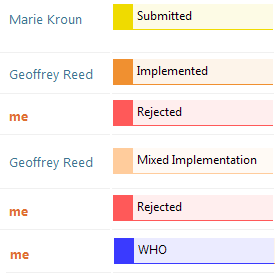http://www.euro-me.org/news-Q42016-002.htm
EMEA Writes to World Health Organisation
The European ME Alliance (EMEA) is a collaboration of 13 ME organisations in European countries who have the common aim of promoting biomedical research into Myalgic Encephalomyelitis and increasing awareness of this debilitating neurological disease.
EMEA has written to the World Health Organisation (WHO) with the Alliance's concerns about planned revisions to the classification of ME.'
Background:
The current classification for Myalgic Encephalomyelitis (ME) in the WHO Classification of Diseases (ICD-10) is under section G93.3 and lists ME as a neurological illness.
The WHO have set up a Joint Task Force to prepare for the 11th Revision of the International Classification of Diseases (ICD-11) and this is due to be ready by 2018.
From the WHO web site [http://www.who.int/classifications/icd/revision/en/] -
The Joint Task Force (JTF) is the steering group for ICD-11 version for Mortality and Morbidity Statistics (ICD-11-MMS). The JTF provides strategic and technical advice to WHO for the finalization of the ICD-11-MMS development. The input will draw on scientific advice, where recommended by the JTF or WHO. The primary focus of the JTF is to recommend the subset of the ICD-11 foundation that will be included as codes in the ICD-11-MMS, used for international reporting, as well as how to appropriately structure those codes for tabulation and aggregation. The JTF will also provide guidance and support for the development of the ICD-11-MMS reference guide, including mortality and morbidity coding rules, the use of post-coordination in the ICD-11-MMS, and the suitability of the product for use as a classification. The JTF may seek advice, as necessary, from any other project stakeholders, such as the RSG, the vertical TAGs, the WHO-FIC Network, or other identified experts.
EMEA's letter to WHO is shown below.
We will publish WHO's reply as soon as it is available.
Further Information:
http://www.euro-me.org/Documents/WHO/EMEA Letter to the WHO_ME-CFS_ICD-11_160818 (Amended) Dec 2016.pdf
EMEA Writes to World Health Organisation
The Disappearance, Continued Absence and Its Consequences of the Enforcement of the ICD-10 G93.3 Within the Linearization of the ICD-11 Public Beta Draft Version
EMEA: PRESS RELEASE - For Immediate Release
The European ME Alliance (EMEA) is a collaboration of 13 ME organisations in European countries who have the common aim of promoting biomedical research into Myalgic Encephalomyelitis and increasing awareness of this debilitating neurological disease.
EMEA has written to the World Health Organisation (WHO) with the Alliance's concerns about planned revisions to the classification of ME.'
Background:
The current classification for Myalgic Encephalomyelitis (ME) in the WHO Classification of Diseases (ICD-10) is under section G93.3 and lists ME as a neurological illness.
The WHO have set up a Joint Task Force to prepare for the 11th Revision of the International Classification of Diseases (ICD-11) and this is due to be ready by 2018.
From the WHO web site [http://www.who.int/classifications/icd/revision/en/] -
The Joint Task Force (JTF) is the steering group for ICD-11 version for Mortality and Morbidity Statistics (ICD-11-MMS). The JTF provides strategic and technical advice to WHO for the finalization of the ICD-11-MMS development. The input will draw on scientific advice, where recommended by the JTF or WHO. The primary focus of the JTF is to recommend the subset of the ICD-11 foundation that will be included as codes in the ICD-11-MMS, used for international reporting, as well as how to appropriately structure those codes for tabulation and aggregation. The JTF will also provide guidance and support for the development of the ICD-11-MMS reference guide, including mortality and morbidity coding rules, the use of post-coordination in the ICD-11-MMS, and the suitability of the product for use as a classification. The JTF may seek advice, as necessary, from any other project stakeholders, such as the RSG, the vertical TAGs, the WHO-FIC Network, or other identified experts.
EMEA's letter to WHO is shown below.
We will publish WHO's reply as soon as it is available.
Further Information:
http://www.euro-me.org/Documents/WHO/EMEA Letter to the WHO_ME-CFS_ICD-11_160818 (Amended) Dec 2016.pdf


